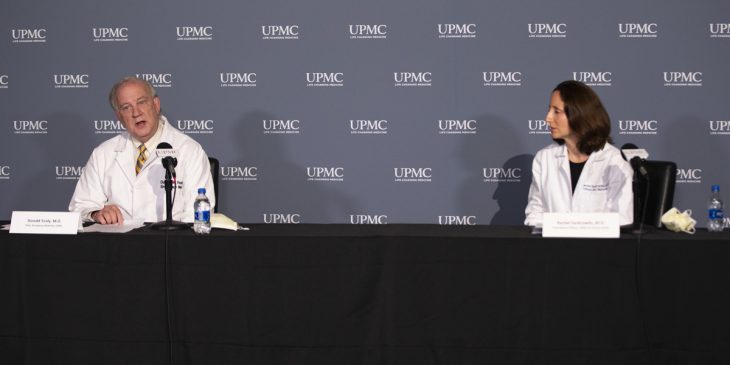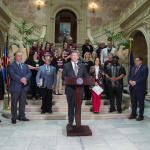UPMC has seen 10% of surgical patients return in recent days and is prepared for demand to accelerate, medical officials announced at a press briefing today.
The announcement came a week after the health system shared that it was thoughtfully resuming essential, medically necessary procedures with testing of asymptomatic patients and appropriate protective measures.
“Our return to essential care is happening against the backdrop of declining numbers of new COVID-19 cases in our hospitals, communities and statewide,” said Dr. Donald Yealy, chair of emergency medicine at UPMC and the University of Pittsburgh. “We always prepared for the worst, cared for those who needed care and used our experiences across UPMC to guide us.”
In the past two months, UPMC has seen tremendous growth in demand for its telemedicine services, with video visits jumping 3,700%, from 250 in early March to 9,500 per day last week. The telemedicine growth, coupled with UPMC’s preparedness for a COVID-19 surge that didn’t materialize, allowed UPMC critical care physicians to lend a hand and serve patients and care teams in New York.
“We reached out to colleagues in New York City and offered our support. New York Presbyterian was immediately receptive, and we quickly implemented a tele-ICU outreach program,” said Dr. Rachel Sackrowitz, chief medical officer of UPMC’s ICU Service Center, explaining that UPMC intensivists volunteered their unpaid, free time around the clock for tele-ICU consults.
“We believe this is yet another innovative way that our medical community came together during this pandemic to solve problems and support each other,” Sackrowitz added. “The tele-ICU model that we established with New York Presbyterian could be replicated nationwide.”
Yealy shared other innovations that UPMC is making to change the paradigm and inform policymakers and public health officials in reopening society. He noted that the majority of COVID-19 deaths in the communities UPMC serves have been among nursing home residents and those with an average age of 80, indicating that a targeted approach to protect these populations is essential.
“Besides our asymptomatic testing and planned antibody testing of all our patients, we are developing innovative ways to diminish the effect of COVID-19 with targeted treatments, even before a vaccine becomes available,” Yealy said. “This will include reliable antibody approaches and other treatments, such as convalescent plasma.”
UPMC will be regularly updating the community on this developing situation. Follow UPMC News for updates.









